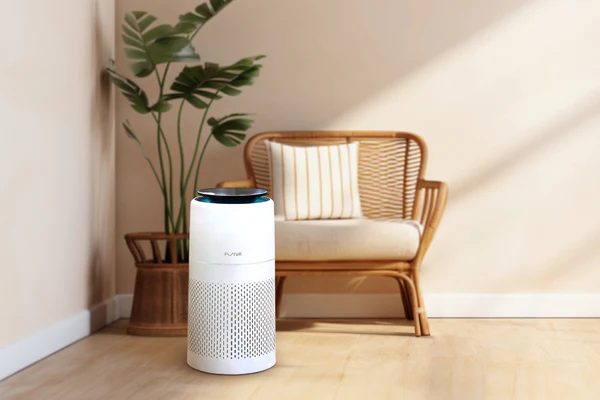Does air purifier help with dust? Today, we spend a lot of time indoors, so it’s essential to know why indoor air quality matters. Indoor air can contain harmful pollutants and allergens that can affect our health. This is where air filters are helpful.
Indoor air filters help clean the air inside your home by removing harmful particles and pollutants. Think of air cleaners for your home as tiny vacuum cleaners that help clean the air you breathe. They work hard, using HEPA filters to catch dust and pollen, carbon filters to remove harmful gases and smells, and UV light to kill germs and viruses. What is the outcome? One of the significant benefits of air purifiers is that they make the air cleaner and easier to breathe.
In this blog, we will examine how air filters work and the many benefits they offer. We will also answer some typical questions, such as whether air purifiers remove dust, if they work, and if they are effective.
What Is An Air Purifier?
An air filter is a device that improves the air inside your home by getting rid of dirt and harmful substances. It is widely used in homes, offices, and other indoor environments to create a healthier and more comfortable living or working place.
An air filter helps clean the air in your home by removing dust, pollen, pet hair, mould spores, and other harmful particles that can trigger allergies or breathing issues. These devices help clean the air by trapping pollutants, making sure the air we breathe is safe and free of dangerous substances.

How Does An Air Purifier Work?
Does air purifier help with dust? An air purifier removes dust, allergens, and other particles from the air in a room. It usually has a fan that pulls in air and filters that trap these particles. Some air purifiers also use UV light or ionisers to kill germs. An air purifier helps create a healthier indoor environment by cleaning the air.
An air purifier is a gadget that cleans the air inside rooms by removing dirt and harmful substances. It works by taking in air from the surrounding space and using different filters or methods to remove harmful particles and dirt. These technologies include HEPA filters, activated carbon filters, ionisers, and UVGI cleaners.
HEPA filters, short for High-Efficiency Particulate Air filters, are widely used in air cleaners. They capture tiny bits in the air like dust, pollen, pet hair, and mould spores. HEPA filters can trap particles as small as 0.3 microns and do this with an effectiveness of 99.97%. This means they can successfully eliminate most allergens and pollutants in the air.
Conclusion
Does air purifier help with dust? This blog revealed how these quiet helpers clean out dust and pollen, improve your immune system, and help you sleep better. We also addressed the critical question: How do air filters work? We also shared advice on using an air filter and the health benefits it offers for cleaner air. Forget about a stuffy nose and enjoy what an air purifier can do: it helps make you healthier and happier!





